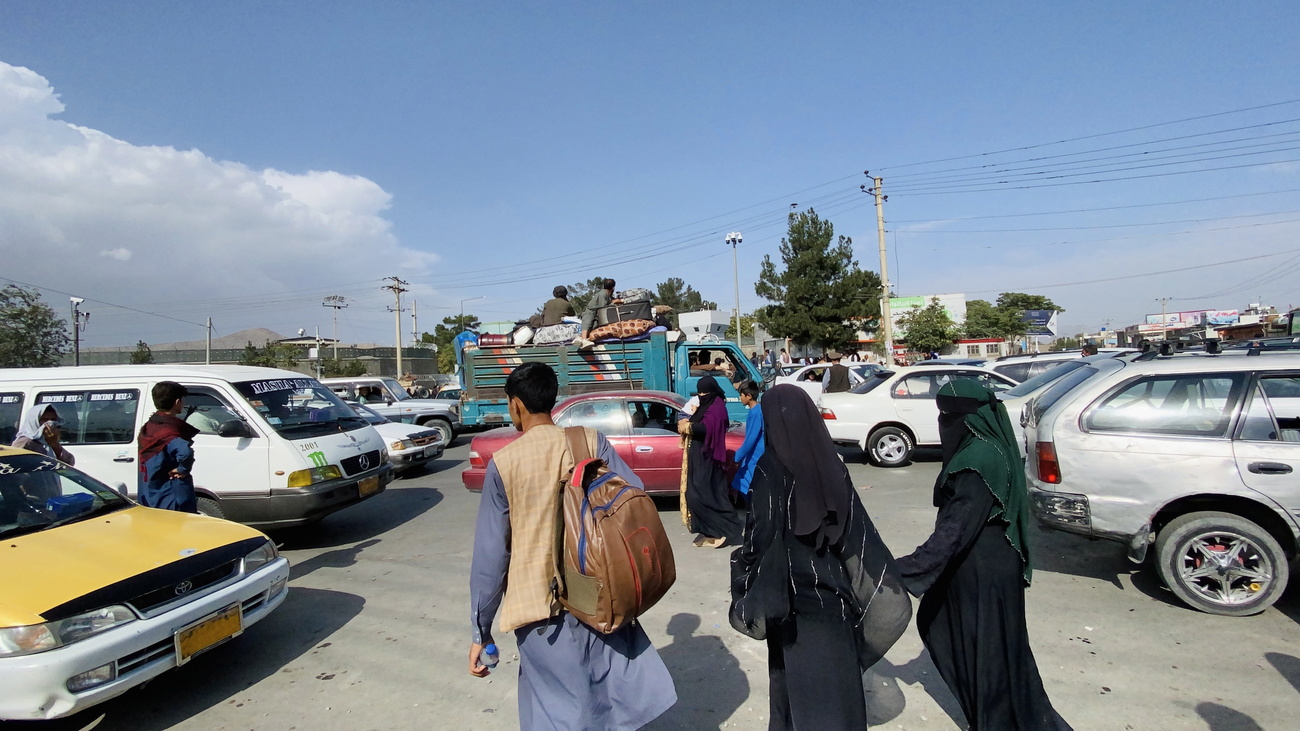
Switzerland divided on taking Afghan refugees

Since Afghanistan fell back into Taliban hands, Bern has suspended deportations to that country and will grant over 200 humanitarian visas to Afghans who worked on Swiss projects. But Switzerland does not plan to accept large numbers of Afghan refugees. This is despite calls from civil society and the political left for it to do more.
Already by the end of 2020 there were 2.6 million registered Afghan refugees worldwide, meaning that more than one in ten refugees is Afghan, according to the United Nations High Commissioner for Refugees (UNHCRExternal link). They are mainly in neighbouring Pakistan and Iran, but there are also over 300,000 Afghan refugees on European soil.
Despite promises by the Taliban to respect women’s rights and not take revenge on those who worked for the West or the previous government, the recent panic at Kabul airport suggests many Afghans do not believe them. UN High Commissioner for Human Rights Michelle Bachelet said this week that her office had received “harrowing reports of violations and abuses of human rights”. She told a special session of the UN Human Rights Council in Geneva that there were “credible reports of serious violations of international humanitarian law and human rights abuses taking place in many areas under effective Taliban control, such as summary executions of civilians, restrictions on the rights of women, including their right to move freely and girls’ right to attend schools, recruitment of child soldiers, and more.”
The recent Taliban takeover of almost all Afghan territory could now push a further 500,000 people into exile, the European Commission and United Nations have warned. But who will take them in? Debate on the issue is gaining momentum in many countries.
Afghan refugees in Switzerland
Afghanistan has for years been one of the main countries of origin of asylum seekers arriving in Switzerland, as elsewhere in Europe. In July, 12,500 Afghans were in the asylum process, according to the Swiss State Secretariat for Migration (SEM).
“The security and human rights situation in Afghanistan has been very difficult for a long time,” well before the Taliban returned to power, Swiss Refugee CouncilExternal link spokeswoman Eliane Engeler told SWI swissinfo.ch.
For those who have been refused asylum and sent back to Afghanistan, “the mere fact of having been in Europe exposes them to threats and violence,” she stated. The Swiss Refugee Council has long called for deportations to Afghanistan to be suspended – a measure finally announced by Switzerland on August 12 and welcomed by the UNHCR. The Swiss Refugee Council now hopes that this freeze “will continue until the situation has really improved”.
Deportations from Switzerland to Afghanistan were in any case never a common practice. The latest date back to 2019 and involved five people. No forced returns took place in 2020 because of the pandemic, SEM told swissinfo.ch.
Over the past 25 years, more than 26,000 asylum applications have been filed in Switzerland by Afghan nationals. Around 1,500 individuals were deported after their appeals were rejected, most of them to countries other than Afghanistan (third countries or Dublin States) and 80 to Afghanistan. No one was ever sent back to Afghanistan while the Taliban were in power in the 1990s.
“Many people of Afghan origin have received protection in Switzerland,” asserted SEM spokesperson Daniel Bach. In 2020, Switzerland’s protection rate (the proportion of asylum seekers granted refugee status or provisional admission out of the total number of cases decided) was “the highest among all European States, at 84%”, according to the SEM.
Indeed, the average protection rate for Afghan refugees is 56% in the European Union, according to EurostatExternal link, albeit with significant differences among the member States (it amounts to nearly 94% in Italy), But international comparisons are tricky because of marked disparities in the types of protection granted.
According to Engeler of the Swiss Refugee Council, Switzerland does protect Afghan refugees, but it is less likely to grant asylum, with the rate being only 16.5%. The vast majority are “admitted provisionallyExternal link” and do not have refugee status. “Provisional admission is a much more uncertain form of protection,” she cautioned.
‘Switzerland must do more’
In view of recent events in Afghanistan, calls to broaden the criteria for accepting those fleeing the country have multiplied in recent days. They come from non-governmental organizations (NGOs) such as the Swiss Refugee Council, but also from left-wing parties, big cities like Geneva and Zurich, and civil society.
“Under a Taliban regime, women are particularly threatened, as are all those who have committed themselves to human rights and democracy,” Engeler warned. “Those women and men who have worked for a Western State, or Western entities such as NGOs, are now at risk, as the Taliban regard them as Western collaborators.”
The Swiss government is under pressure to grant provisional admission to Afghans already in Switzerland, to facilitate the issuing of humanitarian visas and family reunification and also to increase the quotas for Swiss participation in UNHCR resettlement programmes.

More
Swiss hesitate to offer shelter to large numbers of Afghan refugees
These quotas, set for 2021 and 2022 at a maximum 1,600 people in total – from all origins – may be increased by the government in situations of humanitarian emergency, explained the Swiss Refugee Council, which is urging the government to show “generosity”. The Social Democratic Party and Green Party are demanding that Switzerland take in 10,000 people.
Meanwhile, an online petition calling for the immediate acceptance of at least 5,000 Afghans in Switzerland has already garnered over 16,000 signatures.
The UNHCR explained that possibilities for resettlementExternal link of Afghans under its programme are determined by participating governments, and it would also like Bern to do more. “There is a general shortage of existing resettlement contingents worldwide,” Anja Klug, head of the UNHCR Office for Switzerland and Liechtenstein, told SWI swissinfo.ch. “UNHCR would therefore welcome it if the resettlement states, including Switzerland, would consider further increasing existing quotas.” She also urged Switzerland and other states to review family reunificationExternal link applications of Afghans who already have connections with the country and/or initiate a relaxed humanitarian visa scheme like the one approved for Syrians in 2015.
The Swiss Solidarity charity has launched a fundraising campaign to help people impacted by the crisis in Afghanistan.
Money can be donated via the website (https://www.swiss-solidarity.org/)External link or using e-banking services with the IBAN account number CH82 0900 0000 1001 5000 6.
Swiss Solidarity is the humanitarian arm of the Swiss Broadcasting Corporation, SWI swissinfo.ch’s parent company. The foundation also cooperates with private companies and media outlets.
Bern favours aid on the ground
At an August 18 press conference, the Swiss government said it was not currently planning to yield to these demands, but promised aid on the ground. It has also offered mediation services, if desired by the Afghan parties to the conflict.
In the German-language Swiss press, Justice Minister Karin Keller-Sutter defended the government’s position. “There is currently no mass displacement” out of Afghanistan, she said. “Nor can we arbitrarily choose 10,000 people and evacuate them from the crisis zone.”
Switzerland’s immediate priority is to evacuate and welcome local staff from its temporarily closed Kabul cooperation office and their immediate families. These 230 or so people will be granted humanitarian visas, “as they are specifically and acutely threatened in Afghanistan”, according to the SEM. An airplane carrying 219 people evacuated from Afghanistan landed in Switzerland on Tuesday. The passengers included 141 Afghan nationals who had worked at the Swiss Agency for Development and Cooperation (SDC) office in Kabul, plus their family members, who are being given refugee status.
In the Swiss Refugee Council’s view, this is “necessary, but not enough”. “Switzerland must do more to live up to its humanitarian tradition,” Engeler urged. Meanwhile, the SEM spokesman stressed that “the situation in Afghanistan is the subject of continuous monitoring. We are constantly reviewing our asylum practices and will adapt them if necessary”.
Translated from French by Julia Bassam, Edited and adapted by Julia Crawford.

In compliance with the JTI standards
More: SWI swissinfo.ch certified by the Journalism Trust Initiative






























You can find an overview of ongoing debates with our journalists here . Please join us!
If you want to start a conversation about a topic raised in this article or want to report factual errors, email us at english@swissinfo.ch.